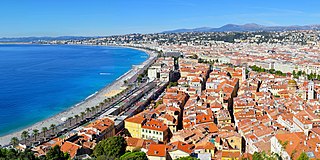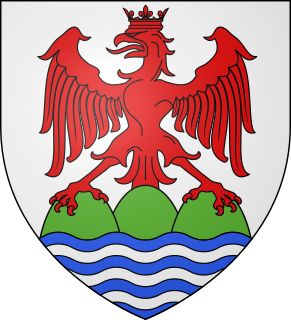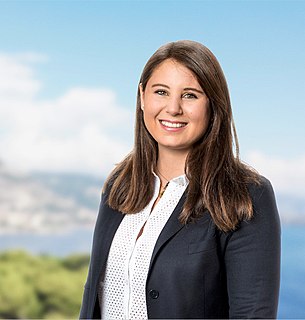
Occitan, also known as lenga d'òc by its native speakers, and sometimes also referred to as Provençal, is a Romance language spoken in Southern France, Monaco, Italy's Occitan Valleys, as well as Spain's Val d'Aran; collectively, these regions are sometimes referred to as Occitània. It is also spoken in Calabria in a linguistic enclave of Cosenza area. Some include Catalan in Occitan, as the distance between this language and some Occitan dialects is similar to the distance between different Occitan dialects. Catalan was considered a dialect of Occitan until the end of the 19th century and still today remains its closest relative.

Nice is the prefecture of the Alpes-Maritimes department in France. The Nice agglomeration extends far beyond the administrative city limits, with a population of nearly 1 million on an area of 744 km2 (287 sq mi). Located on the French Riviera, the southeastern coast of France on the Mediterranean Sea, at the foot of the French Alps, Nice is the second-largest French city on the Mediterranean coast and second-largest city in the Provence-Alpes-Côte d'Azur region after Marseille. Nice is approximately 13 kilometres (8 mi) from the principality of Monaco and 30 kilometres (19 mi) from the French–Italian border. Nice's airport serves as a gateway to the region.

The French Riviera is the Mediterranean coastline of the southeast corner of France. There is no official boundary, but it is usually considered to extend from Toulon, Le Lavandou or Saint-Tropez in the west to Menton at the France–Italy border in the east. The coast is entirely within the Provence-Alpes-Côte d'Azur region of France. The Principality of Monaco is a semi-enclave within the region, surrounded on three sides by France and fronting the Mediterranean. The French Riviera contains the seaside resorts of Cap-d'Ail, Beaulieu-sur-Mer, Saint-Jean-Cap-Ferrat, Villefranche-sur-Mer, Antibes, Juan-les-Pins, Cannes, Saint-Raphaël, Fréjus, Sainte-Maxime and Saint-Tropez.

Occitania is the historical region in Western and Southern Europe where Occitan was historically the main language spoken, and where it is sometimes still used, often as a second language. This cultural area roughly encompasses the southern third of France, as well as part of Spain, Monaco, and smaller parts of Italy. Occitania has been recognized as a linguistic and cultural concept since the Middle Ages, but has never been a legal nor a political entity under this name. However, the territory was united in Roman times as the Seven Provinces and in the Early Middle Ages.
Niçard, nissart/Niçart, niçois, or nizzardo is the dialect that was historically spoken in the city of Nice, in France, and in all the area of the historical County of Nice. The affiliation of Niçard is debated: it is generally considered a subdialect of Provençal, itself a dialect of Occitan, while some scholars argue that the historical dialect spoken in Nice was more strictly Ligurian.

Salade niçoise, salada nissarda in the Niçard dialect of the Occitan language, insalata nizzarda in Italian, is a salad that originated in the French city of Nice. It is traditionally made of tomatoes, hard-boiled eggs, Niçoise olives and anchovies or tuna, dressed with olive oil, or in some historical versions, a vinaigrette. It has been popular worldwide since the early 20th century, and has been prepared and discussed by many chefs. Delia Smith called it "one of the best combinations of salad ingredients ever invented" and Gordon Ramsay said that "it must be the finest summer salad of all".

Didier Frédéric Thierry Digard is a French professional football manager and former player who is the head coach of Championnat National 3 side Nice B. As a player, he was a defensive midfielder.
Clément Rosset was a French philosopher and writer. He was a professor of philosophy at the University of Nice Sophia Antipolis, and the author of books on 20th-century philosophy and postmodern philosophy.
In many countries the term local derby, or simply just derby means a sporting fixture between two rivals, particularly in Association Football. In North America, crosstown rivalry is a more common term.
In Occitan, vergonha refers to the effects of various language discriminatory policies of the government of France on its minorities whose native language was deemed a patois, where a Romance language spoken in the country other than Standard French, such as Occitan or the langues d'oïl, as well as other non-Romance languages such as Alsatian and Basque, were suppressed. Vergonha is imagined as a process of "being made to reject and feel ashamed of one's mother tongue through official exclusion, humiliation at school and rejection from the media", as organized and sanctioned by French political leaders from Henri Grégoire onward.

Anthony Mounier is a French professional footballer who plays as a left winger for Greek Super League 2 club Kallithea.

Italian irredentism in Nice was the political movement supporting the annexation of the County of Nice to the Kingdom of Italy.

Mylène Farmer en concert is Mylène Farmer's 1989 concert tour in support of her second studio album, Ainsi soit je.... It was the first tour of the singer.

Marie Rouanet is an Occitan singer and writer.
Hélène Pastor was a Monegasque businesswoman and heiress. She headed what is seen as Monaco’s ‘second dynasty’, and was the richest woman in the principality. She was assassinated by a gang that included her son-in-law, who was subsequently jailed for life in 2018.

Anne Peichert, known by her stage name Louane Emera or simply Louane, is a French singer and actress.
The prix Vérité is a French literary award bestowed by the commune of Le Cannet in the Alpes-Maritimes department of southeastern France..

Marine Brenier is a French politician who served as a member of the French National Assembly from 2016 to 2022, representing the department of Alpes-Maritimes. She is a member of two political center-right parties, Horizons and La France Audacieuse.

Agathe-Sophie Sasserno was a French poet. She was born in Nice and spent her life there. Although she wrote in French, she considered herself Italian.

Niçard Italians are Italians who have full or partial Nice heritage by birth or ethnicity.














